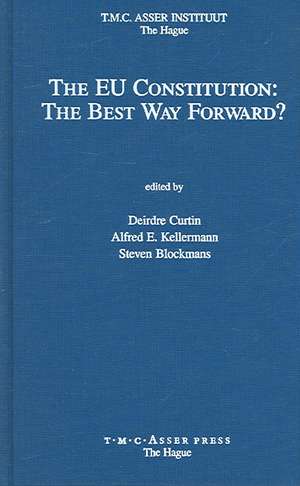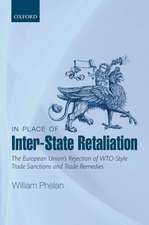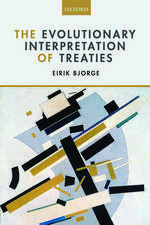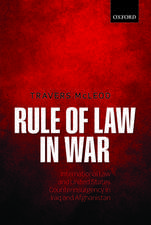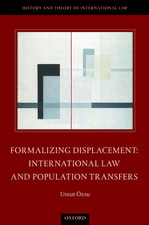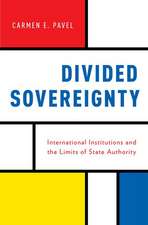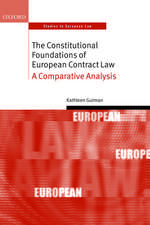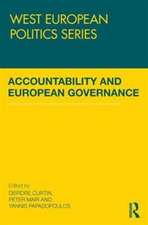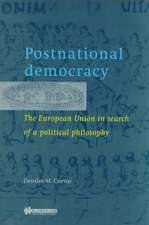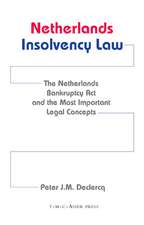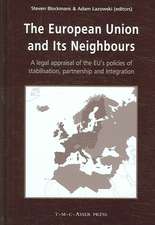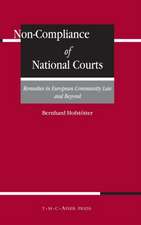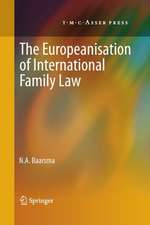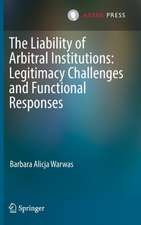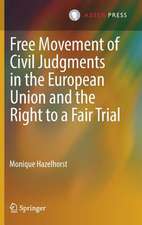The EU Constitution: The Best Way Forward?
Editat de Deirdre Curtin, Alfred E. Kellerman, Steven Blockmansen Limba Engleză Hardback – 31 dec 2005
On 29 October 2004, the Treaty Establishing a Constitution for Europe was signed by the leaders of the 25 Member States of the European Union. This event marked the end of the discussion rounds to amend the treaties on which the European Union is founded. Yet, the debate on the Constitution was far from over when on 29 May and 1 June 2005 the French and the Dutch voters rejected the Treaty. Politicians and lawyers are now confronted with the question of how to proceed and how to go forward.
In October 2004, the T.M.C. Asser Institute in The Hague, The Netherlands, organized the 34th Session of its Asser Institute Colloquium on European Law, which was entitled ‘The EU Constitution: The best way forward?’. During the Conference some 50 experts from the 25 Member States, from candidate, potential candidate and neighbouring countries, as well as from the US and Russia focused on key topics like: the process and impact of EU constitution-making, the democratic life of the EU, improving the efficiency and quality of legislation in the EU, the expansion of executive, judicial and legislative powers, and the access to justice. In anticipation of the developments after the signing of the Treaty, three eminent speakers – Prof. Joseph Weiler (New York University), Professor Bruno de Witte (European Institute in Florence) and Professor Jo Shaw (University of Manchester), elaborated on many answers in case of a ratification crisis.
This book contains the proceedings of the three-day Conference and includes, next to the papers of the speakers and commentators, reports of the discussions on each topic and the texts of two keynote speeches. A keyword Index and a List of Articles (of the Treaty Establishing a Constitution for Europe, the Treaty on European Union and the Treaty Establishing the European Community) greatly enhance the accessibility of the rich materials. The book will be of great help and interest to political leaders, members of parliament, international lawyers and European citizens in formulating answers to the questions that have risen after the rejection of the Treaty by the French and Dutch voters and give powerful impulses to the continuing debate and efforts to arrive at a generally accepted Constitution for Europe.
Deirdre Curtin is Professor of European and International Governance at Utrecht School of Governance, Utrecht, The Netherlands. Alfred E. Kellermann is Senior Legal and Policy Advisor and Visiting Professor in the law of the EU at the T.M.C. Asser Institute and Steven Blockmans is a Senior Researcher in the law of the EU at the T.M.C. Asser Institute, The Hague, The Netherlands.
Preț: 966.27 lei
Preț vechi: 1178.38 lei
-18% Nou
Puncte Express: 1449
Preț estimativ în valută:
184.95€ • 200.97$ • 155.46£
184.95€ • 200.97$ • 155.46£
Carte tipărită la comandă
Livrare economică 21 aprilie-05 mai
Preluare comenzi: 021 569.72.76
Specificații
ISBN-13: 9789067042000
ISBN-10: 9067042005
Pagini: 555
Ilustrații: XXXII, 557 p.
Dimensiuni: 155 x 235 x 37 mm
Greutate: 1.04 kg
Ediția:1st Edition.
Editura: T.M.C. Asser Press
Colecția T.M.C. Asser Press
Locul publicării:The Hague, Germany
ISBN-10: 9067042005
Pagini: 555
Ilustrații: XXXII, 557 p.
Dimensiuni: 155 x 235 x 37 mm
Greutate: 1.04 kg
Ediția:1st Edition.
Editura: T.M.C. Asser Press
Colecția T.M.C. Asser Press
Locul publicării:The Hague, Germany
Public țintă
ResearchCuprins
The Process and Impact of EU Constitution-making: Voice and Exit.- On the Power of the Word: Europe’s Constitutional Iconography.- The Process of Ratification and the Crisis Options: A Legal Perspective.- Referendums on the Constitutional Treaty 2004: A Citizens’ Voice?.- Flexibility and the Treaty Establishing a Constitution for Europe.- The Process and Impact of EU Constitution-Making: ‘Voice and Exit’.- The Constitutional Treaty and the Nature of European Constitutionalism: The Tension between Intergovernmentalism and Constitutionalism in the European Union.- Wine-Bottling Legitimacy or EU Legitimation by a Written Constitution.- Discourse, Authority and the Making of the EU Constitution.- Transparency and Legal Instruments in the EU Constitution.- Drawing the Threads Together from Parts I and III of the EU Constitution.- La Loi Europeénne: Promise and Pretence.- Control of Executive acts: The Procedural Solution. ‘Proportionality, State of the Art Decision-Making and Relevant Interests’.- Operational Collaboration on Justice, Security and Policing in the Constitutional Framework.- Transparency in the Exercise of Power in the ‘Constitutionalized’ Union: The Problem of Diffused Leadership and Responsibility.- The Democratic Life of the European Union.- The Role of Parliaments in the EU Constitutional Framework: A Partnership or Rivalry?.- Theory and Reality of Public Access to EU Information.- European Citizenship: Origin, Contents and Perspectives.- The European Ombudsman and the EU Constitution.- Expansion of Executive, Judicial and Legislative Powers.- Shared Leadership in the EU: Theory and Reality.- The Unstoppable Advance of the European Council.- The Evolution in the Role and Powers of the European Commission.- The Expanding Role of the European Parliament.- Expansion of Executive, Judicial and Legislative Powers — A Contribution to the Debate.- Some Reflections on the Expansion of Executive, Judicial and Legislative Powers.- Access to Justice and the EU Constitution.- The Workload of the EU Courts and the Citizen’s Right to Have Access to a Judge.- The Expanding Role of the National Courts and the EU Constitution.- The Impact of the EU Constitution on the Relationship between Strasbourg and Luxembourg.- The Expanding Jurisdiction of the EU Court of Justice.- Constitutionalizing Effective Remedies: Too Much on EU Courts, Too Little on National Courts.- Some Thoughts on Access to Justice within the European Constitutional Framework.- The Impact of the EU Constitution on selected Member States and neighbouring Countries.- The Impact of the EU Constitution on the National Constitutions: Focusing on the Netherlands’ Constitutional Debate.- Some Points Concerning the EU Constitution from a Hungarian Perspective.- The Construction of The European Union: Recommendations from a Balkan Perspective.- The EU Constitution and Its Impact on Relations with the Russian Federation.
